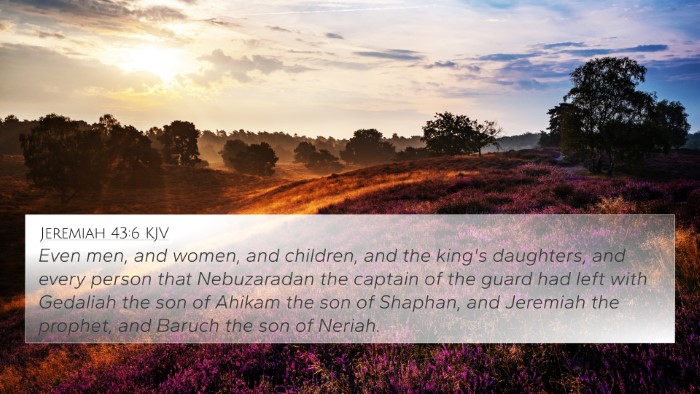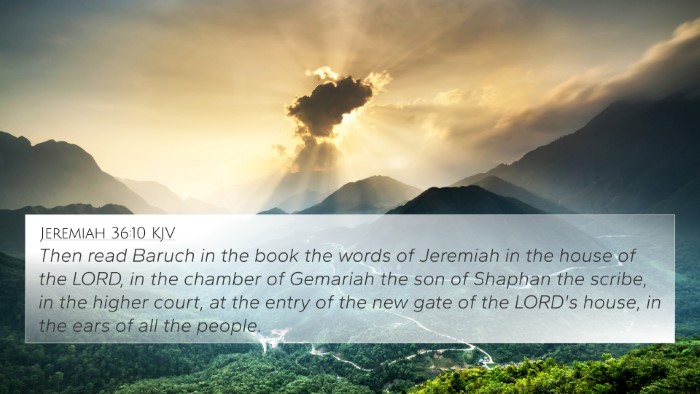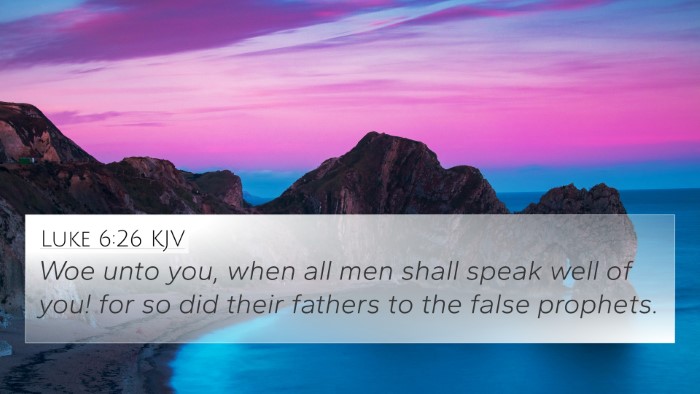Understanding Jeremiah 43:3
Jeremiah 43:3 states: "But Baruch the son of Neriah setteth thee against us, to deliver us into the hand of the Chaldeans, that they might put us to death, and carry us away captives into Babylon." This verse is situated within a larger context where the people of Judah are conflicted about their fate and are influenced by the words of Baruch, the scribe.
Exegesis and Commentary
This section provides an interpretation of Jeremiah 43:3 with insights from public domain commentaries.
Matthew Henry's Commentary
Matthew Henry remarks on the atmosphere of suspicion and fear that permeates the actions of the people. He notes that they accuse Baruch of having ulterior motives, suggesting that he influences Jeremiah to promote a course of action that would lead them into captivity. Henry's analysis dives into the themes of trust and betrayal, highlighting the strained relationship between the prophet and the people.
Albert Barnes' Notes
Albert Barnes suggests that this verse reflects the tension in Jerusalem as people are grappling with the impending doom brought forth by the Babylonian exile. He interprets the allegations against Baruch as a manifestation of the people's disbelief and frustration. Barnes emphasizes that there is a tendency for individuals to blame others during times of crisis, thus demonstrating the human instinct for self-preservation, even at the expense of truth.
Adam Clarke's Analysis
Adam Clarke expands the contextual understanding of this verse by exploring its historical significance. He discusses Baruch’s role as a scribe for Jeremiah, emphasizing how the people’s distrust in Baruch is reflective of a larger rejection of God’s prophetic word. Clarke points out that this refusal to heed God’s message often leads communities into deeper turmoil and spiritual disarray.
Key Themes and Connections
This verse encapsulates several key themes: distrust in divine guidance, the role of prophetic voices, and the human tendency to cast blame during crises. Below are thematic connections and cross-references related to Jeremiah 43:3:
- Call to Reflection: Lamentations 3:39 - This verse encourages a self-examination of the people's situation.
- The Rejection of the Prophets: Matthew 23:37 - Jesus speaks of Jerusalem's history in rejecting the prophets.
- Consequences of Disobedience: Jeremiah 25:11-12 - Foretells the Babylonian captivity as a consequence of disobedience.
- Fear of Babylon: Jeremiah 34:2 - The prophecy of calamity brought by Babylon is reiterated.
- Trust in God vs. Fear of Men: Proverbs 29:25 - A reminder of where true safety lies.
- The Role of Scribes: Nehemiah 8:1 - Highlights the importance of scribes in conveying God’s message.
- Discontent with God’s Plan: Isaiah 30:1 - Reflects a similar distrust in the prophetic message.
Comparative Bible Verse Analysis
In understanding Jeremiah 43:3, one can draw comparative insights from various related texts. By exploring these connections, a holistic view emerges around the themes of prophecy, human response to divine direction, and the cultural context of fear in times of uncertainty:
- Connection with Isaiah: Isaiah 53:3, depicting the suffering servant as one rejected, parallels the rejection faced by Jeremiah and Baruch.
- Echoes in the New Testament: John 1:11 - "He came to His own, and His own did not receive Him," serving as a reminder of a continuing theme of rejection.
Tools for Bible Cross-Referencing
To delve deeper into the meaning of Jeremiah 43:3 and its interconnections, several tools can facilitate this exploration:
- Use a Bible Concordance to locate themes and keywords in Scripture.
- A Cross-reference Bible Study guide offers structured insights into related passages.
- Employ a Bible Reference Resource to uncover historical context and commentary.
Conclusion
In conclusion, Jeremiah 43:3 serves as a poignant reminder of the struggles faced by the people of Israel during their tumultuous times. Through the analysis of this verse, we uncover layers of meaning that resonate throughout Scripture. The use of cross-references enriches our understanding and unveils the intricate dialogue between various parts of the Bible, inviting deeper reflection on our own trust in God’s directions amidst challenges.












